
How do I know what to feed my dog?? (Especially with so much info and brands marketing their food! It can be confusing!)
In a recent survey of pet owners, about 25% revealed that they change the diet they feed their dog or cat every 12 months!!! (I was actually very shocked by that!) Interestingly, dog owners are most likely to switch to a higher quality food more than cat owners. Cat owners are more motivated by which food their cat likes eating. Because a lot of veterinarians are not trained in pet nutrition, many are turning online and to veterinarians and pet nutritionists who understand pet nutrition and species-appropriate diet. Some change foods depending on special nutritional needs of their pet.
Did you know that what food a pet parent feeds is one of the most emotional purchases they make? (You may even be clicking out of this blog already!) LOL. If not–thanks for hanging in there with me!!!
 ….oops, this sweetie fell asleep in his bowl…awww…
….oops, this sweetie fell asleep in his bowl…awww…
Did you make changes to your pet’s diet over the last year? If so, you’re among the quarter of U.S. pet parents who did. And I bet you’ve often wondered to yourself—“Could “this issue” (insert symptom) be due to dietary issues? (Lack of, usually) If you answered “yes” then you are one of the rare pet owners who really take an interest in what is considered “species-appropriate” so you can be assured what you are feeding is nutritionally complete and safe.
“In my opinion, this is a positive trend! I applaud you! Since the introduction of commercially prepared pet food around 100 years ago, the (really awful) nutrition advice most pet parents have received is to find an ultra-processed diet their animal companion likes, and feed it to them twice a day, every day for the rest of their lives.”—Dr. Karen Becker, DVM
Reasons some ‘Pet Parents’ Switch Pet Foods
- They want a higher quality product
- Pet likes it better
- Pet stopped eating old food
- The new food is better for my dog/cat
- My breeder recommended it
- (or my favorite) “My vet recommends it” Me:” What’s in it?” Them:” I don’t know.” Me: Does your vet know?” Vet and person: “No, and we can’t find out.” (I hear this a lot, especially with some of the “special diet foods”)
So, for cats—go ahead—find something they enjoy and is good for them! They deserve it!!! We must serve our royal kitties, after all, they DO rule the world (and dogs drool??) RIGHT???
One commonly overlooked problem that causes pets to stop eating their food is the pet food goes rancid, and fast! Fats sprayed on pet food can begin to go bad in as little as two weeks after opening the bag. (imagine your food sitting in a warehouse after being made—weeks—perhaps not even temp controlled—then sitting in another warehouse waiting in a truck, no temperature control– for weeks on end…then another warehouse—then the shelves—you get my drift…Many opportunities to go rancid, thus all of the dog food recalls almost daily. Or, and I love this, the dog food company/brand changes their ingredients and does not inform the consumer 🙁 Oh, I detest this. And our dogs suffer unknowingly. This is a danger to our pets.
Because most pet parents don’t get nutritional information from their veterinarian, when it comes to what influences pet parents to switch, surveys show that veterinarians top the list of where they go to for food recommendations. Second, in line was advice from family and friends like ‘uncle Ted” who always fed _______.” (not so good—aaaand…Ted does not look like he watches HIS diet too carefully. Haha…)
(Don’t get me wrong, we ALL could do with some better nutrition and exercise–and so can our dogs!)
While veterinarians may be the “single top influencers” according to the survey, based on the percentages shown, many more pet parents don’t get nutrition advice from their vets than do. So we are going to expose you to veterinarians who know about animal physiology and species-appropriate feeding to help you learn what is appropriate and absolutely necessary for your pet to receive nutritionally. (Unfortunately, many people take advice from veterinarians who don’t understand pet nutrition, and others who don’t really care about their own eating habits, let alone their pets…example above)
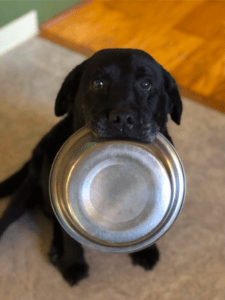 ERICA…one of our most enthusiastic eaters!
ERICA…one of our most enthusiastic eaters!
Sadly, in both human and animal medicine, nutrition is often discussed only when there appears to be a problem that arises with the pet and there is suspicion it may be nutritionally connected. If there is no glaring health issues, usually nutrition is not even acknowledged. Sadly, also, by that time it can be too late and intervention may take longer –or the harm of years of non-appropriate ingredients may have already taken their toll. Now you are going to shell out logs of “DOUGH” for that food uncle Tommy thought was just ‘great. If you ARE experiencing allergies, itching, skin and coat issues, ear infections, dull coat or greasy skin/smell, you may not have thought that what you are putting into your pet may actually be causing these issues or is making them worse. But its at least something to consider since many veterinarians like Dr. Ian Billinghurst, DVM have spent their lives (Ian spent 40 years) researching, writing and communicating proper nutrition for pets. (See “Give your dog a Bone” by Dr. Ian Billinghurst—it will not only revolutionize your pet’s health, but you may learn a LOT about nutrition for yourself, as well, like I did! (Bonus!) Dr. Karen Becker is also a GREAT source!
It seems the hesitancy of the veterinary community to talk about pet diets has prompted more than a few veterinary journal articles mocking how badly veterinarians hate talking about nutrition with clients, and that most consult “Dr. Google” instead of actually consulting a dog food company or supplier that employs holistic veterinarians to formulate food with this scientific research over time. They’ll refer to people giving nutritional info as ‘crazies and wackos.’ (kind of how I feel because I’m a Paleo eater myself–people scoff at me). Mostly, I think pet owners fall for media advertising, cute photos on bags, marketing gimmicks, and pretty looking bags. I guess if vets knew more, clients would not have to go to the internet to find good information. Veterinarians probably just carry what the pharmaceutical reps bring them, and those foods show up as the “worst of the worst” on some dog food lists.
“Worse still is that at many of the veterinary schools in North America, the instruction vet students do receive comes from the biggest pet food producers in the business. Needless to say, the “training” the students get from these companies is heavily slanted in favor of the products they sell, which are inevitably ultra-processed.” Dr. Karen Becker, DVM
READ DR. BILLINGHURST’S ARTICLE, “LET’S BEAT PANCREATITIS!”
After all, the food you offer your canine or feline family member represents the foundation upon which their wellbeing, vitality, and long-term quality of life are built. Is your pet experiencing any skin or coat issues? Allergies? Cysts? Tumors? Ear Infections? GI distress? It could definitely be the ingredients in your food (or lack of). Many legumes, soy, and beans have been snuck in to replace premium proteins, and are not species-appropriate for canines and felines. These improper ingredients are wreaking havoc on our pet’s skin and coat and hormones (I’m sure you can come to your own conclusions of those horrors…ask any woman who has had a hysterectomy!)
If your pet has eaten the same food “forever,” then consider this: When ultra-processed foods began to be marketed to the masses, the notion they should have the same food every day forever was touted as well. This is opposed to what canines and felines eat in the wild– a variety of foods their bodies were MEANT to digest and thrive on. For the finicky pet, you could try switching between two different foods, or if feeding raw, just change protein sources each month and keep them interested..and VERY happy! Support companies that are privately held, employ veterinarians to formulate their products, use premium ingredients, and offer education to the consumer. Also, look for one with probiotics and prebiotics that do not break down over time. Most of these private companies get their food to you within days of it being made—so the potency is HIGH. Here’s one we highly recommend and you can compare your food to theirs right on the website: CLICK HERE
My second choice is nutritionally complete, gently cooked food or a dehydrated or freeze-dried diet that has been reconstituted with lots of water. Here’s both a raw, fresh version and here is a freeze-dried version great for traveling or if you have no refrigeration. I love Dr. Billinghurst’s recipe–so I stick with it —BARF (stands for Biologically Appropriate Raw Food)
Dogs and cats diagnosed with cancer should be eating an anti-inflammatory, anti-cancer (starch-free) diet free of excessive carbohydrates, which has been shown to increase cancer growth. Therefore many vets put cancer patients on a low carb, high protein diet (take note of the species-appropriate change that may have prevented the problem in the first place). The secret about cancer is taking away its FUEL!!!
If your animal companion is getting up in years, or if it’s a puppy—we recommend an ALL LIFE STAGES FOOD, and your dog does well on a kibble, so as to feed a nutritionally, optimal, species-specific, fresh diet rich in healthy fats, including omega-3 fatty acids. These types of All-Life Stage foods don’t just give weight/amount charts, but include and take into consideration the special needs at EACH stage of life and show you how to feed accordingly.
Eliminate all refined carbohydrates (aka hidden sources of sugar—you’ll even find sugars in the so-called “Freshpet” raw in the freezer chests in big box stores—no thanks!) — keep grains, potatoes and legume intake to a minimum or eliminate these foods altogether, as are causing inflammation in the body.
The right diet with probiotics will also enhance your pet’s microbiome, which has been linked to improved cognitive health and enhanced immune system (for many of you, anti-vaxxers—or cautious vaxxers). There are still many new strains of canine and feline diseases that there are no vaccines for yet, so it is OUR JOB to keep our pet’s immune system running at its optimal level!!!

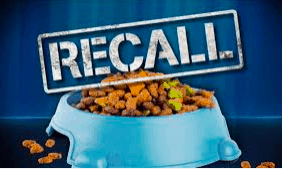


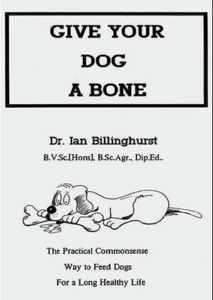

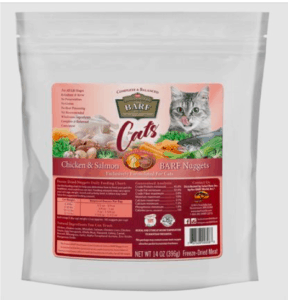
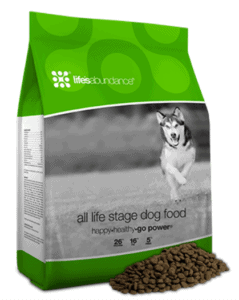
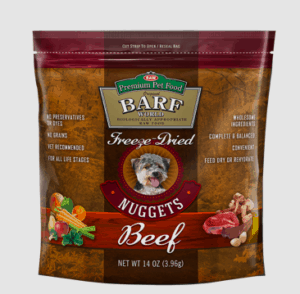
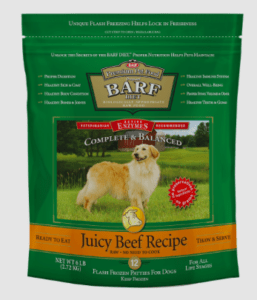
 …oh, and don’t forget to KISS your Dog today!!!
…oh, and don’t forget to KISS your Dog today!!!